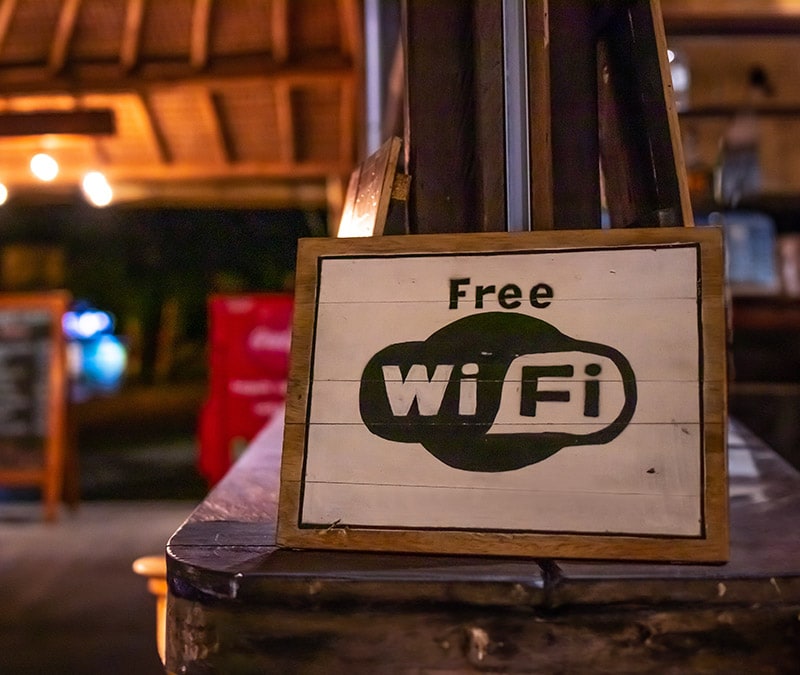How does a VPN work and should I use one?
Using a virtual private network, or VPN, can help protect your online privacy and data. Here’s how.

The internet is not a very private place. If you connect to public Wi-Fi for things like banking, shopping and surfing, your online privacy could be invaded and your data taken. Using a VPN can help.
What does VPN stand for?
A VPN stands for Virtual Private Network and can mask information about your IP address allowing you to go online anonymously. How? A VPN uses encryption to protect your communications on whatever device you’re using, including phone, laptop, or tablet. It sends your data through a secure tunnel to the VPN service provider’s servers. Your data is encrypted and rerouted to whatever site you’re trying to reach.
VPN Explained
A VPN enables you to connect to the internet in an encrypted fashion. Encryption adds security and privacy, which is especially important when using public Wi-Fi. That’s because cybercriminals may be able to target public Wi-Fi to steal the personal information you send and receive while on those types of networks.
It could even get worse. You could think you’re using the free public Wi-Fi hotspot provided at an airport, hotel, or coffee shop. But you may have logged on to a Wi-Fi network that only appears to be legitimate. Guess what? A cybercriminal may have created the network to steal data from unsuspecting victims when they log on.
A VPN allows you to use non-private public Wi-Fi by creating an encrypted tunnel through which your data is sent to a remote server operated by your VPN service provider. The VPN server then sends the data to the site you’re seeking to connect with, encrypted helping keep your online activity and history private. There is no certain way to choose the best VPN but you can choose between free VPN that can sometimes give basic cover, or a paid subscription that can give you more comprehensive protection.
Types of VPN security protocols
VPNs use a variety of different protocols. Older protocols, such as PPP and PPTP, are considered less secure. Here are some of the types of security protocols.
- IP Security (IP Sec). Internet Protocol Security is a popular protocol that protects data through either a transport mode or a tunnel mode. Both provide encryption. It’s considered highly secure and is useful for securing inbound and outbound traffic. But it can require a lot of processing power, and that can affect device performance. Also, some of the security algorithms used in IPSec in the past have been hacked by cybercriminals. Newer versions of IPSec use stronger, more complex algorithms.
- Layer 2 Tunnelling Protocol (L2TP)/IPSec. L2TP is a VPN protocol that doesn’t encrypt data by itself. That’s why it’s paired with IPSec encryption. One of its primary advantages? It’s available on most devices and operating systems and provides a high level of security. The downside? It can result in slower connections. That’s because it uses the double encapsulation process.
- Secure Sockets Layer (SSL) and Transport Layer Security (TLS). SSL was the encryption protocol VPNs generally used before 2015. It has evolved into TLS for encryption of data traveling to an SSL VPN server. One of the reasons that SSL has been largely replaced in VPNs is due to the large number of vulnerabilities discovered in the protocol.
- Point-to-Point Tunnelling Protocol (PPTP). PPTP was the earliest of security protocols and first released in Windows 95. It’s fast, but that’s because the protocol provides a low level of encryption.
- Secure Shell (SSH). The SSH protocol isn’t considered especially user-friendly and doesn’t automatically encrypt all your data. It’s more difficult for users to configure. Plus, fewer providers use this protocol, which limits your choices.
- Secure Socket Tunnelling Protocol (SSTP). This Microsoft-developed protocol is considered highly secure and easy to use, but it doesn’t work as well on platforms other than Windows™.
- Internet Key Exchange, Version 2 (IKEv2). This protocol is based upon IPSec. It’s considered quite secure and fast. One downside? It can be blocked by firewalls.
- Open VPN. This is perhaps the most popular VPN protocol. It combines high security and speed. Because it’s open source, numerous third parties maintain and update the technology. Norton uses this protocol for its VPN, Norton Secure VPN which now comes included in Norton 360.
Why should I use a VPN?
Using your most trusted VPN service can help transform your connection to the internet into a safer and more secure experience. It can enhance the security of your personal information and your online privacy.
For instance, consider the dangers of using public Wi-Fi. Cybercriminals may be able to access personal data you send and receive, even if the network you’re on is password-protected. In some cases, the data can be used to steal personal information or to access your online accounts. A VPN can help protect your data in two ways. For one, it can help prevent data from being stolen through a phony public Wi-Fi set up by a cybercriminal. It can also help protect data being passed on a legitimate public Wi-Fi that’s been hacked by a cybercriminal.
The enhanced online privacy provided by a VPN is also a reason for considering the use of a VPN for your devices at home even when you are not on public Wi-Fi.
In short, here’s what the benefits of a VPN look like. VPNs help protect by:
- Encrypting the data sent and received over the Web.
- Masking your location for anonymity
- Securing the personal information you send and receive while on public Wi-Fi, helping to protect your online data being vulnerable to attacks like spear-phishing.
How to set-up vpn?
Setting up and using a VPN is quite easy. With services like Norton Secure VPN, you simply download the software to your device, install and click connect! Your public Wi-Fi connections become secure.

Protect your online privacy with more than just a VPN
A VPN to help protect your online privacy when connecting to Wi-Fi is important but have you thought about the many other ways in which cybercriminals can access your information?
Cyberthreats are evolving. It’s not just viruses infecting your desktop PC anymore, but everchanging cyberthreats that can put your online privacy as well as your private and financial information on your devices at risk.
Norton is evolving, too: Introducing Norton™ 360. Multiple layers of protection against existing and emerging cyberthreats in today’s connected world ‒ in one single solution.
With Norton™ 360 you get real-time protection for your PC, Mac®, iOS or Android™ device against viruses, phishing and other cyberthreats. Plus, Norton Secure VPN adds bank-grade encryption to help secure the information you send and receive on Wi-Fi connections and helps prevent companies from tracking your online activities or locations. Access content on your favourite websites and apps as if from the security of your own home.
Norton Password Manager provides the tools you need to generate and store all your passwords, credit card information and other information online. Norton Cloud Backup for PC helps store important files ‒ from documents and family photos to financial data ‒ as a preventive measure against the loss of data due to hard drive failures, stolen devices and even ransomware. Norton SafeCam for PC alerts and helps you block unauthorized access to your webcam. And Norton Parental Control‡, providing you with easy-to-use tools that allow you to set screen time limits, block unsuitable sites or monitor search terms and activity history to help your kids navigate their connected world more safely.
Norton™ 360. Easy-to-use protection for your devices, online privacy and more. All in a single solution.
Editorial note: Our articles provide educational information for you. Our offerings may not cover or protect against every type of crime, fraud, or threat we write about. Our goal is to increase awareness about Cyber Safety. Please review complete Terms during enrollment or setup. Remember that no one can prevent all identity theft or cybercrime, and that LifeLock does not monitor all transactions at all businesses. The Norton and LifeLock brands are part of Gen Digital Inc.




Want more?
Follow us for all the latest news, tips, and updates.